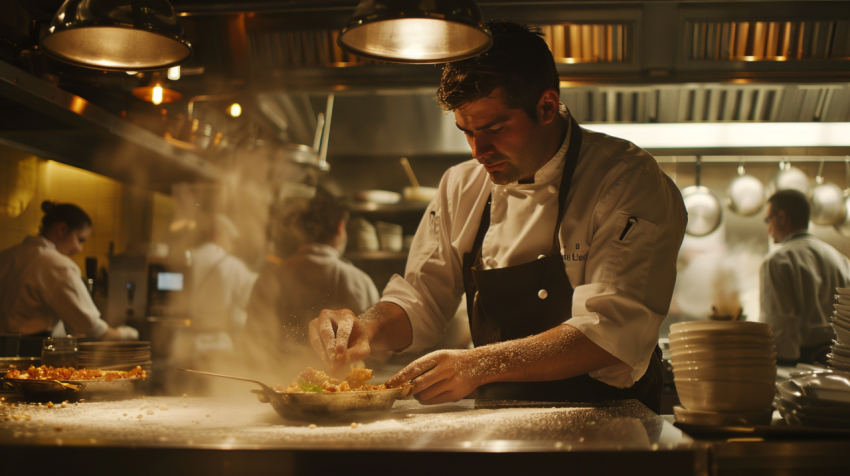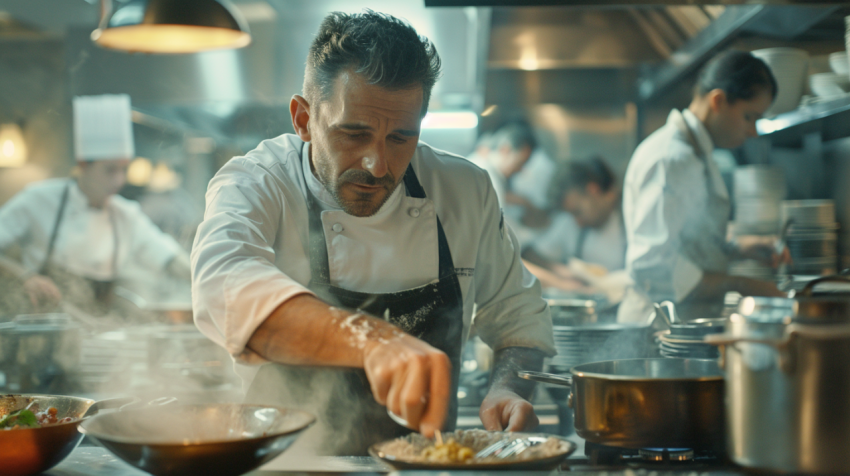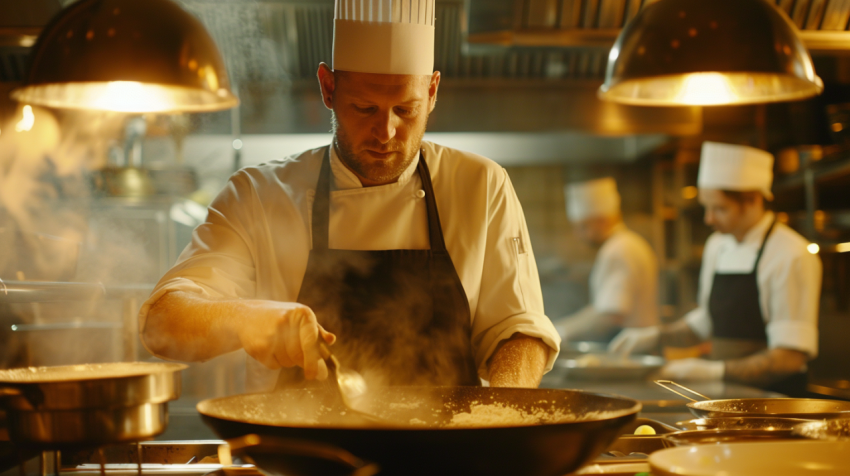



The Culinary Artist: The Role, Skills, and World of a Chef
A chef is a highly skilled and trained professional cook who is proficient in all aspects of food preparation, often specializing in a particular cuisine or area of culinary arts. The role of a chef extends beyond simply cooking; it encompasses creativity, leadership, management, and a deep understanding of ingredients, flavors, and culinary techniques. This exploration delves into the multifaceted world of chefs, examining their diverse roles and responsibilities, the essential skills and knowledge required, the various career paths available, and the artistry, passion, and dedication that define these culinary professionals.
1. Roles and Responsibilities of a Chef:
The specific duties of a chef can vary depending on their position, the type of establishment they work in, and their level of experience. However, some common responsibilities include:
- Menu Planning and Development: Creating menus that are appealing, balanced, and profitable, taking into account factors such as seasonality, dietary restrictions, and cost.
- Food Preparation: Preparing and cooking food items according to recipes and standards, ensuring quality, consistency, and proper presentation.
- Supervising Kitchen Staff: Managing and training cooks, prep cooks, and other kitchen personnel.
- Inventory Management: Ordering and receiving food supplies, managing stock levels, and minimizing waste.
- Quality Control: Ensuring that all food meets quality standards for taste, appearance, and safety.
- Cost Control: Managing food costs, labor costs, and other expenses to maintain profitability.
- Sanitation and Safety: Maintaining a clean and sanitary work environment, following food safety regulations, and ensuring the safety of staff and customers.
- Recipe Development: Creating new dishes and recipes, experimenting with flavors and techniques.
- Equipment Maintenance: Overseeing the proper use and maintenance of kitchen equipment.
2. Hierarchy in the Professional Kitchen (Brigade System):
Many professional kitchens follow a hierarchical structure known as the brigade system, developed by Auguste Escoffier:
- Chef de Cuisine (Executive Chef): The head chef, responsible for overall kitchen management, menu creation, and staff supervision.
- Sous Chef: The second in command, assisting the executive chef and supervising the kitchen staff in their absence.
- Chefs de Partie (Station Chefs): Chefs responsible for specific sections of the kitchen, such as:
- Saucier: Sauce chef
- Poissonnier: Fish chef
- Rôtisseur: Roast chef
- Grillardin: Grill chef
- Friturier: Fry chef
- Entremetier: Vegetable chef
- Potager: Soup chef
- Garde Manger: Cold foods chef (salads, appetizers, etc.)
- Pâtissier: Pastry chef
- Boulanger: Baker
- Commis: Junior cooks who work under a chef de partie to learn and gain experience.
- Apprentice: Entry-level cooks in training.
3. Essential Skills and Knowledge for Chefs:
- Culinary Techniques: Proficiency in various cooking methods, such as sautéing, braising, roasting, grilling, frying, and baking.
- Knife Skills: Expert knife handling skills for chopping, dicing, mincing, and other cutting techniques.
- Flavor Pairing: Understanding how different flavors complement and enhance each other.
- Food Safety and Sanitation: Knowledge of proper food handling, storage, and sanitation practices to prevent foodborne illness.
- Menu Planning: Ability to create balanced, appealing, and cost-effective menus.
- Recipe Development: Skill in creating and modifying recipes.
- Leadership and Management: Ability to manage and motivate a team of cooks and other kitchen staff.
- Communication Skills: Effective communication with staff, suppliers, and customers.
- Time Management: Ability to work efficiently and manage time effectively in a fast-paced environment.
- Creativity and Innovation: Developing new dishes, experimenting with flavors, and staying current with culinary trends.
- Problem-Solving: Ability to troubleshoot issues and find solutions quickly in a high-pressure environment.
- Business Acumen: Understanding of food costs, labor costs, pricing, and other business aspects of running a kitchen.
4. Education and Training for Chefs:
- Culinary School: Formal culinary education programs provide hands-on training in cooking techniques, food safety, and kitchen management.
- Apprenticeships: Working under experienced chefs to gain practical experience and learn on the job.
- On-the-Job Training: Many chefs start as prep cooks or line cooks and work their way up, gaining experience and skills along the way.
- Certifications: Professional certifications, such as those offered by the American Culinary Federation (ACF), can demonstrate a chef's skills and knowledge.
- Continuing Education: Chefs often participate in workshops, seminars, and other continuing education opportunities to stay current with culinary trends and techniques.
5. Different Career Paths for Chefs:
- Restaurant Chef: Working in various types of restaurants, from casual to fine dining.
- Hotel Chef: Managing food service operations in hotels, including restaurants, banquets, and room service.
- Catering Chef: Preparing food for events, such as weddings, parties, and corporate functions.
- Private Chef: Working for individuals or families, preparing meals in their homes.
- Personal Chef: Similar to a private chef but may serve multiple clients on a part-time basis.
- Pastry Chef: Specializing in desserts, pastries, and baked goods.
- Research Chef: Developing new food products and recipes for food manufacturers.
- Culinary Instructor: Teaching cooking and culinary arts in schools or other settings.
- Food Writer/Critic: Writing about food, restaurants, and culinary trends.
- Food Stylist: Preparing and arranging food for photography or film.
- Food Service Management: Overseeing the operations of restaurants, cafeterias, or other food service establishments.
6. The Art and Passion of Cooking:
Being a chef is not just a job; it's often a passion and a form of artistic expression. Chefs are driven by:
- Creativity: Developing new dishes and experimenting with flavors and techniques.
- Passion for Food: A deep love and appreciation for ingredients and the culinary arts.
- Dedication and Hard Work: The culinary profession is demanding, requiring long hours and a strong work ethic.
- Attention to Detail: Precision and meticulousness in food preparation and presentation.
- The Desire to Please: Chefs derive satisfaction from creating delicious and memorable dining experiences for their guests.
7. Famous Chefs and Culinary Influences:
Many chefs have gained international recognition for their culinary skills, creativity, and contributions to the food world. Some notable examples include:
- Auguste Escoffier: A legendary French chef who revolutionized restaurant cooking and developed the brigade system.
- Julia Child: An American chef, author, and television personality who popularized French cuisine in the United States.
- Gordon Ramsay: A British chef, restaurateur, and television personality known for his fiery temperament and high standards.
- Thomas Keller: An American chef and restaurateur known for his acclaimed restaurants, The French Laundry and Per Se.
- Ferran Adrià: A Spanish chef known for his innovative and avant-garde cuisine at his restaurant El Bulli.
- Alice Waters: An American chef, restaurateur, and food activist who is a pioneer of the farm-to-table movement.
- Anthony Bourdain: An American chef, author, and travel documentarian who explored the world's cultures through food.
Conclusion:
Chefs are culinary artists who combine their skills, knowledge, and passion to create delicious and memorable dining experiences. They play a vital role in the food industry, from menu planning and food preparation to kitchen management and innovation. Whether working in a bustling restaurant, a quiet bakery, or a private home, chefs bring creativity, dedication, and a deep love of food to their craft, enriching our lives with their culinary creations.
Chef, Cook, Culinary, Cuisine, Kitchen, Restaurant, Menu, Recipes, Food, Cooking, Baking, Pastry, Sous Chef, Executive Chef, Chef de Cuisine, Chef de Partie, Brigade System, Auguste Escoffier, Culinary Arts, Culinary School, Culinary Techniques, Knife Skills, Flavor Pairing, Food Safety, Sanitation, Menu Planning, Recipe Development, Leadership, Management, Communication, Time Management, Creativity, Innovation, Problem-Solving, Business Acumen, Food Cost, Labor Cost, Restaurant Management, Hotel Chef, Catering Chef, Private Chef, Personal Chef, Pastry Chef, Research Chef, Culinary Instructor, Food Writer, Food Critic, Food Stylist, Food Service Management, Famous Chefs, Julia Child, Gordon Ramsay, Thomas Keller, Ferran Adrià, Alice Waters, Anthony Bourdain, Farm-to-Table, Molecular Gastronomy, Michelin Star, James Beard Award

